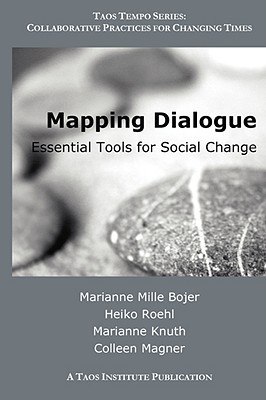
- We will send in 10–14 business days.
- Author: Mille Bojer Marianne
- Publisher: Taos Institute Publications
- ISBN-10: 0971231281
- ISBN-13: 9780971231283
- Format: 15.2 x 22.9 x 0.9 cm, minkšti viršeliai
- Language: English
- SAVE -10% with code: EXTRA
Reviews
Description
In a world of increasing complexity, answers have a short life-span and people have a growing desire to solve their own problems. Sustainable social change is increasingly depending on successful dialogue. This book provides a closer look at transformative dialogue tools and processes for social change. It profiles ten dialogue methods in depth, and another fifteen more briefly. The methods covered conceptually and in case studies include Deep Democracy, Appreciative Inquiry, Open Space Technology, Scenario Planning, World Cafe, the Israeli-Palestinian School for Peace and many more. The book gives insight into the foundations of practical dialogue work, a dictionary to distinguish dialogue from other forms of conversation, and inspiration from traditional African approaches to dialogue. The authors, an international team of Dialogue Practitioners, offer guidelines for assessing what tools to use for which situation on the basis of their experiences. This makes it a unique and indispensable resource for the practitioner of social change.
EXTRA 10 % discount with code: EXTRA
The promotion ends in 22d.13:04:11
The discount code is valid when purchasing from 10 €. Discounts do not stack.
- Author: Mille Bojer Marianne
- Publisher: Taos Institute Publications
- ISBN-10: 0971231281
- ISBN-13: 9780971231283
- Format: 15.2 x 22.9 x 0.9 cm, minkšti viršeliai
- Language: English English
In a world of increasing complexity, answers have a short life-span and people have a growing desire to solve their own problems. Sustainable social change is increasingly depending on successful dialogue. This book provides a closer look at transformative dialogue tools and processes for social change. It profiles ten dialogue methods in depth, and another fifteen more briefly. The methods covered conceptually and in case studies include Deep Democracy, Appreciative Inquiry, Open Space Technology, Scenario Planning, World Cafe, the Israeli-Palestinian School for Peace and many more. The book gives insight into the foundations of practical dialogue work, a dictionary to distinguish dialogue from other forms of conversation, and inspiration from traditional African approaches to dialogue. The authors, an international team of Dialogue Practitioners, offer guidelines for assessing what tools to use for which situation on the basis of their experiences. This makes it a unique and indispensable resource for the practitioner of social change.


Reviews